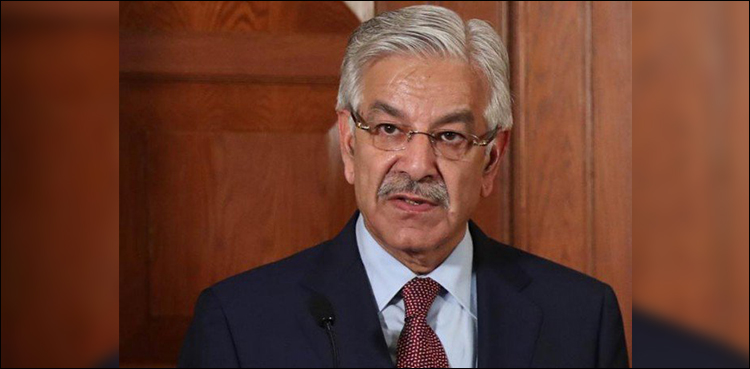Afghanistan not taking steps to root out terrorism: Pak def minister
Fri 29 Mar 2024, 10:31:50

Islamabad: Afghanistan is not making any progress to root out terrorism from its soil, Pakistan’s Defence Minister Khawaja Asif has said, urging the Taliban rulers in Kabul to tighten border controls further to mitigate the threat faced by his country.
“In view of the increase in terrorist incidents, there is a need for a fundamental change in the border situation. The source of terrorism in Pakistan is in Afghanistan and despite our efforts, Kabul is not making any progress in this direction,” Asif posted on X on Wednesday.
Pakistan, which has witnessed a series of terror attacks in recent months, has openly said it suspects the involvement of the Tehreek-e-Taliban Pakistan (TTP), a splinter group of Afghan Taliban. According to the Dawn newspaper, Asif regretted that despite the Taliban administration being aware of the hideouts of terrorism, terrorists were operating freely against Pakistan from their territory. “Cooperation from Kabul (for tackling terrorism threat) is not available,” the minister emphasised.
Asif’s comments came against the backdrop of a string of attacks over the past few days including those on the Gwadar Port Authority complex and naval base in Turbat and the suicide attack on the van carrying Chinese workers in Shangla in the restive Khyber Pakhtunkhwa province.
The report said that the minister posted these remarks on X after attending a special security meeting convened by Prime Minister Shehbaz Sharif and added, “His remarks in a way reflected the discussion at the meeting as PMO statement on
security meeting had expressed concern over ‘sanctuaries available to terrorists across the borders’ and had called for “a regional approach’ for countering terrorism.”
security meeting had expressed concern over ‘sanctuaries available to terrorists across the borders’ and had called for “a regional approach’ for countering terrorism.”
A video clip that recently went viral on social media showed an Afghan Taliban member, identified as Yahya, assisting Pakistani terrorists based in Afghanistan in planning a cross-border attack on Pakistani troops deployed along the border, the newspaper said.
The defence minister describing the complexity of the border security challenge said the Pak-Afghan border was different from the traditional international borders.
“Pakistan will have to enforce all international laws and traditions on this border and the traffic of terrorists will have to be stopped. In this way, both countries can promote their relations like traditional good neighbours. Travel facilities can be continued through passport and visa,” he maintained.
Since November 1, Pakistan has required that all Afghan citizens must possess a valid passport and visa to enter the country. Simultaneously there was a significant shift to a “one document regime” policy marking a departure from the longstanding practice of issuing special travel permits to individuals from tribes that span the nearly 2,600-kilometre border between Afghanistan and Pakistan.
However, it remains unclear which new measures the minister was referring to for enhancing control over cross-border movements, the Dawn report added.
No Comments For This Post, Be first to write a Comment.
Most viewed from International
Most viewed from World
AIMIM News
Latest Urdu News
Most Viewed
May 26, 2020
Do you think Canada-India relations will improve under New PM Mark Carney?
Latest Videos View All
Like Us
Home
About Us
Advertise With Us
All Polls
Epaper Archives
Privacy Policy
Contact Us
Download Etemaad App
© 2025 Etemaad Daily News, All Rights Reserved.



.jpg)






.jpg)
.jpg)








.jpg)
.jpg)
.jpg)
.jpg)
.jpg)

















